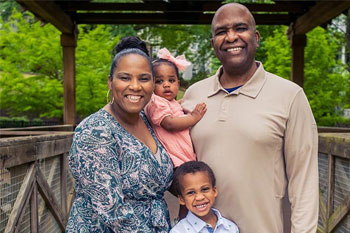“Don’t you want a child of your own?”
“Isn’t adoption incredibly expensive?”
“What if his birth mother comes to take him back?”

The media often portrays an inaccurate picture of adoption, full of drama. So, lots of people are led to believe the adoption misconceptions they see in the media are typical in real adoptions.
We encourage you to educate your family and friends with the truth to these 4 commonly-believed adoption misconceptions:
1. “The birth parents can come back to reclaim their child at any time!”
The fact is, after the adoption is final, the birth parents are unable to reclaim their child. They’re able to change their minds up to the point that they sign relinquishment papers. But once the adoption is final, this is no longer the case. At that point, you’ll become the child’s legal parents. You might have heard adoptive families referred to as “forever families,” because it truly is forever.
2. “You must be wealthy to adopt.”
Adoption can be costly, but that doesn’t mean that rich celebrities are the most common adoptive couples. Most are ordinary, middle-class people. The cost to adopt varies, with international adoption being the most costly. There’s a type of adoption to fit every lifestyle and budget. And if you adopt domestically, the adoption tax credit may reimburse most of your expenses. The bottom line is, everyone’s situation is different, so you’ll need to determine what type of adoption works best for you.
3. “Most birth mothers are unstable, unwed teenagers.”
Actually, birth mothers are a variety of ages within the range of childbearing years. Some are in their teens and forties, but the majority of birth mothers that Lifetime sees are in their twenties and thirties. Instead of focusing on their age and circumstances, we encourage you to share that birth mothers are creating a well-thought-out plan to give their child a life that they can’t provide.
4. “It’s difficult to bond with a child you’re not biologically connected to.”
The truth is, adoptive parents share a deep and lasting bond with their child. Ask any adoptive parent, and they’ll tell you that there’s no difference in the love felt for a biological or an adopted child. This child is considered their “own,” regardless of the fact they didn’t give birth. After all, love, not biology, is what creates a family.
Get real-life examples of how open adoption can play out by checking out our free adoption webinars!
Heidi Keefer is a Content Creator for Lifetime Adoption and has over 15 years of experience in the field of adoption. An author of thousands of articles and social media posts over the years, Heidi enjoys finding new ways to educate and captivate Lifetime’s ever-growing list of subscribers.
Heidi has a keen eye for misplaced apostrophes, comma splices, and well-turned sentences, which she has put to good use as a contributor to Lifetime’s award-winning blogs. She has written and published hundreds of adoption articles which explore the various facets of domestic infant adoption today.





0 Comments